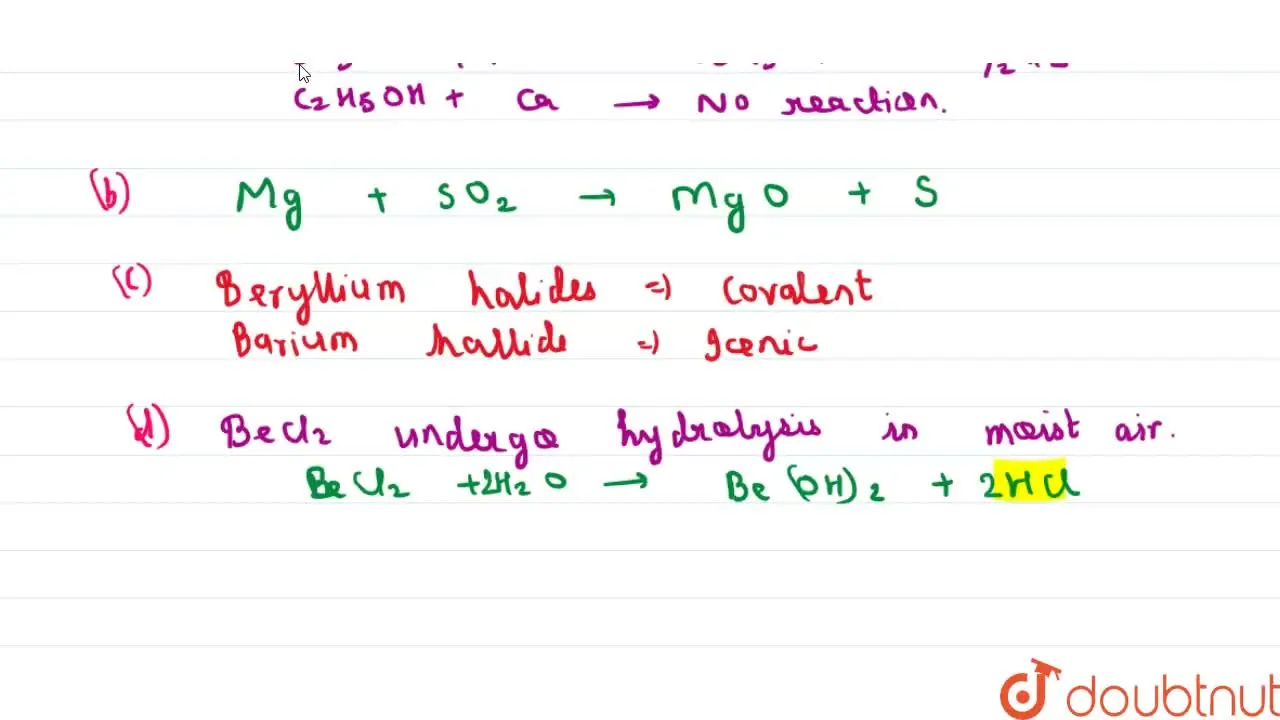Give reasons for the following:
Why is calcium preferred over sodium to remove last traces of moisture from alcohol?
A piece of burning magnesium ribbon continues to burn in SO2.
Halides of Be are soluble in organic solvents, while those of Ba are insoluble
BeCl2 fumes in moist air, but other alkline earth metal chloride do not.
(a). Both calcium and sodium react with water to form their respective hydroxides.
Ca+2H2O→Ca(OH)2+H2
2Na+2H2O→2NaOH+H2
Sodium reacts vigorously with alcohol to form sodium ethoxide, but calcium reacts very slowly.
2Na+2ROH→2RONa+H2Sodium ethoxide
2Ca+2ROH→2ROCa+H2
Thus, when calcium is used, it reacts more readily with water rather tahn sodium.
(b). A piece of burning Mg continues to burn in SO2, since it produces MgO and S.
Mg+SO2Δ−−→MgO+S
The reaction is highly exothermic and the heat produced keeps the magnesium ribbon burning.
(c ). Halides of Be are covalent due to high polarising ability of Be2+ ion, hence they are soluble in orginic solvents. whereas halides of Ba are ionic and thus are insoluble in organic solvents.
(d). BeCl2 being a salt of weak base Be(OH)2 and strong acid (HCl) gets hydrolysed to from HCl, which fumes in air.
BeCl2+2H2O→Be(OH)2+2HCl
But other alkaline earth metal chloride MCl2 being salt of strong base [M(OH)2] and strong acid (HCl) do not undergo hydrolysis and hence no fames of HCl are produced.

Related Playlists
- BOOK - CENGAGE CHEMISTRY ENGLISHCHAPTER - S-BLOCK GROUP 2 - ALKALINE EARTH METALSEXERCISE - Concept Application Exercise3videos
S-BLOCK GROUP 2 - ALKALINE EARTH METALS
- BOOK - CENGAGE CHEMISTRY ENGLISHCHAPTER - S-BLOCK GROUP 2 - ALKALINE EARTH METALSEXERCISE - Ex 5.1 Objective2videos
S-BLOCK GROUP 2 - ALKALINE EARTH METALS
- BOOK - CENGAGE CHEMISTRY ENGLISHCHAPTER - S-BLOCK GROUP 2 - ALKALINE EARTH METALSEXERCISE - Exercises Archives Subjective9videos
S-BLOCK GROUP 2 - ALKALINE EARTH METALS
- BOOK - CENGAGE CHEMISTRY ENGLISHCHAPTER - S-BLOCK GROUP 1 - ALKALI METALSEXERCISE - Archives Subjective8videos
S-BLOCK GROUP 1 - ALKALI METALS
- BOOK - CENGAGE CHEMISTRY ENGLISHCHAPTER - SOME BASIC CONCEPTS AND MOLE CONCEPTEXERCISE - Archives Subjective11videos
SOME BASIC CONCEPTS AND MOLE CONCEPT
Similar Questions
Give reason for the following:
Molybdenum is used in the manufacture of ammonia.View SolutionGive reason for the following:
The reaction of chlorine with hydrogen sulphide is deemed a redox reaction.View SolutionGive reason for the following:
Zinc granules are used in lab preparation of hydrogenView SolutionGive reason for the following:
Purified and dried hydrogen is collected over mercuryView SolutionGive reason for the following: Iron is rendered passive with fuming nitric acid.
View SolutionGive reason for the following:
Zeolites act as shape selection catalysts.View SolutionGive reason for the following:
+1 gallium undergoes disproportionation reaction.View SolutionGive reason for the following:
The end of the thistle funnel should be dipped under acid.View SolutionGive reason for the following:
Silver nitrate solution is kept in coloured bottles.View SolutionGive reason for the following:
Potassium and sodium are not used for reaction with dilute hydrochloric acid or dilute sulphuric acid in laboratory preparation of hydrogen.View Solution


